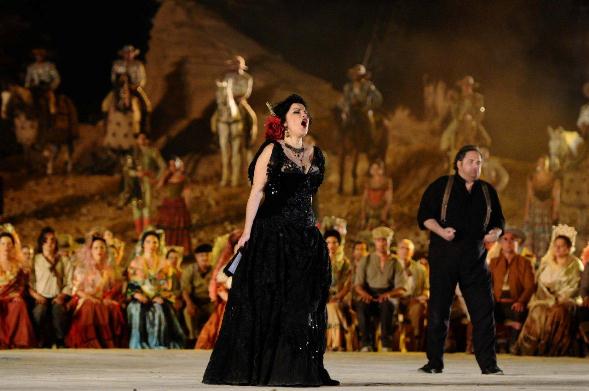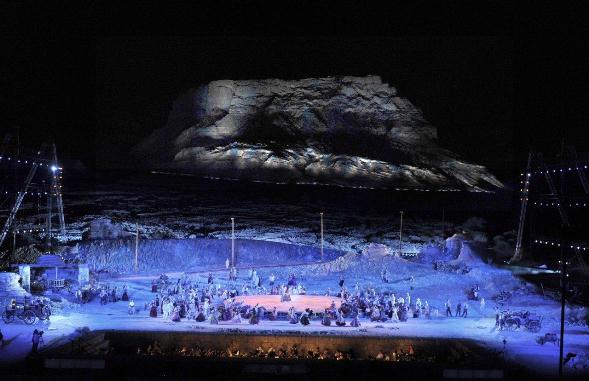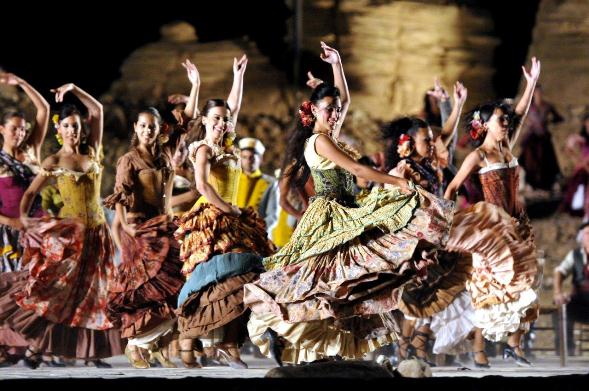The pleasure one derives from a superior operatic performance, aficionados will tell you, comes from many things: the music, the singing, the staging. One thing that is just as important, but less often mentioned – at least explicitly – is the setting. Whether a box seat at the Met or quaffing champagne on the grass at Glyndebourne, the sense of occasion that the superior operatic locations create is crucial to the experience.

In this sense, Masada already has an advantage over many other operatic venues, even before the fat lady starts singing. There’s something magnificently awesome about staging an event of such magnitude in the shadow of the awesome citadel. And that aside, where better to give a uniquely Israeli twist to the institution of Opera? Kebabs and Borekas in place of Hors d’oeuvres and delicate finger food; baseball hats and summer shirts in place of evening dress. And, lets face it, it’s not every day where you get to see the Maestro conducting in denim, as did conductor Daniel Oren on this sweltering summer night. True, it was the full general rehearsal, the night before the grand opening of Carmen. But still…
Only in its third year, the Israeli Opera’s production at Masada has already began to take on the airs of a long standing tradition. Certainly, there was something of an air of familiarity about this year’s choice of production. Carmen, Georges Bizet’s last opera before his early death, was somewhat controversial in its time, what with its themes of infidelity and betrayal, Gypsy women smoking on stage and its heroine, the tempestuous, amoral temptress engineering a fatal love triangle. But we are more that a century away from its premiere in 1875. More to the point, there are undoubted parallels between the opera’s Andalusian settings and the sweeping majesty of the Judean desert. And perhaps also in the temperament on display in the tragic tale of love and murder.

Firstly, a few words about the staging: it would be difficult to understate the effort and energy put into transforming the foot of Masada into a world class venue. 2,500 workers were involved in putting together the 7,500 seater arena. Organisation, including parking and facilities, were efficient and competent. Hospitality – including the aforementioned Kebabs – were a bit on the dear side, but it is very hard to argue with the opportunity to snaffle on a greasy hot-dog washed down with cold beer whilst awaiting the rise of the curtain. High culture meets the middle brow, and everyone goes away happy.
The location allows for a much more expansive production than might have been possible in a traditional opera setting: 10 horses, as many donkeys, The Rishon Le Zion Symphony Orchestra; 30 flamenco dancers from Spain, the Israeli Opera Chorus, the senior and junior Ankor youth choirs. With literally a cast of hundreds – if not quite thousands – it would be hard to remain immune to the grandeur of the setting.
Whilst all the principals spoke warmly about the experience of singing in Israel and of the rehearsal facilities in the run up to this year’s production, there is a question mark about the suitability of the dry and dusty desert for delicate vocal chords. Certainly, there a ripple of disappointment ran through the capacity audience when just before the commencement, it was announced that Anna Malavasi – the scheduled Carmen for the evening – was indisposed, and that her place would be taken by the young Israeli Mezzo Soprano Na’ama Goldman. But no fear: this was the revelation of the evening.

It has become almost customary nowadays to give operas a more contemporary setting, bringing their stories of basic amorality and duplicity up to date as it were. One’s never quite sure what to make of this; if the story endures, then there is no reason to tinker with it, one might argue. But it is always helpful to recognise age old dilemmas presented in a setting with which we can identify. All that said, this staging of Carmen was resolutely traditional: but Goldman, 26 and a graduate of the Jerusalem Academy of Music and Dance, brought a most unexpected contemporary presence to proceedings. Her haughty grandeur, her dark sultry looks, her sneers and asides, the sheer physical presence with which she inhabited the role brought to mind – most improbably, I know, but bear with me – another tragic heroine of our times, the late Amy Winehouse. Goldman’s voice probably has not reached full maturity yet, but I think that on the back of her stellar performance, she is certainly a name to watch for the future.
And, almost before it started, it was over. The rehearsals went off without anything more than the most minor of hitches, and augers well for the season. Next year, Turandot. I’ll certainly be there.
Carmen, by Georges Bizet, an Opera Comique in four acts, performed by the Israeli Opera
Masada, Israel, June 7,9,10,11,12 2012





